英语中whatwhateverthatwhatwhowhoever的用法
- 格式:docx
- 大小:13.37 KB
- 文档页数:1
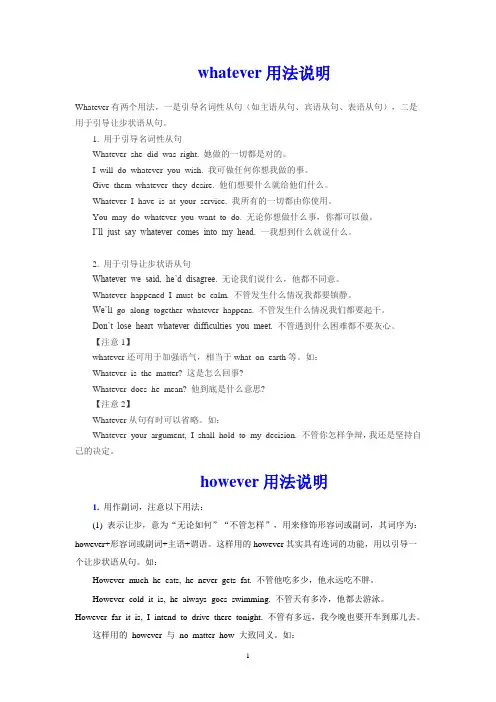
whatever用法说明Whatever有两个用法,一是引导名词性从句(如主语从句、宾语从句、表语从句),二是用于引导让步状语从句。
1. 用于引导名词性从句Whatever she did was right. 她做的一切都是对的。
I will do whatever you wish. 我可做任何你想我做的事。
Give them whatever they desire. 他们想要什么就给他们什么。
Whatever I have is at your service. 我所有的一切都由你使用。
You may do whatever you want to do. 无论你想做什么事,你都可以做。
I’ll just say whatever comes into my head. 一我想到什么就说什么。
2. 用于引导让步状语从句Whatever we said, he’d disagree. 无论我们说什么,他都不同意。
Whatever happened I must be calm. 不管发生什么情况我都要镇静。
We’l l go along together whatever happens. 不管发生什么情况我们都要起干。
Don’t lose heart whatever difficulties you meet. 不管遇到什么困难都不要灰心。
【注意1】whatever还可用于加强语气,相当于what on earth等。
如:Whatever is the matter? 这是怎么回事?Whatever does he mean? 他到底是什么意思?【注意2】Whatever从句有时可以省略。
如:Whatever your argument, I shall hold to my decision. 不管你怎样争辩,我还是坚持自己的决定。
however用法说明1.用作副词,注意以下用法:(1) 表示让步,意为“无论如何”“不管怎样”,用来修饰形容词或副词,其词序为:however+形容词或副词+主语+谓语。
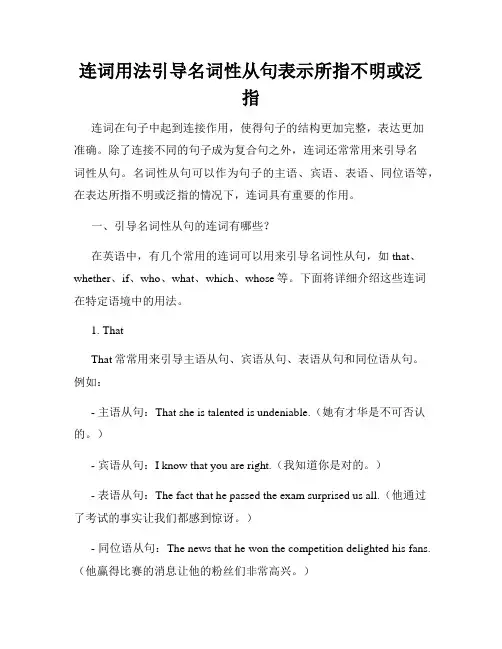
连词用法引导名词性从句表示所指不明或泛指连词在句子中起到连接作用,使得句子的结构更加完整,表达更加准确。
除了连接不同的句子成为复合句之外,连词还常常用来引导名词性从句。
名词性从句可以作为句子的主语、宾语、表语、同位语等,在表达所指不明或泛指的情况下,连词具有重要的作用。
一、引导名词性从句的连词有哪些?在英语中,有几个常用的连词可以用来引导名词性从句,如that、whether、if、who、what、which、whose等。
下面将详细介绍这些连词在特定语境中的用法。
1. ThatThat常常用来引导主语从句、宾语从句、表语从句和同位语从句。
例如:- 主语从句:That she is talented is undeniable.(她有才华是不可否认的。
)- 宾语从句:I know that you are right.(我知道你是对的。
)- 表语从句:The fact that he passed the exam surprised us all.(他通过了考试的事实让我们都感到惊讶。
)- 同位语从句:The news that he won the competition delighted his fans.(他赢得比赛的消息让他的粉丝们非常高兴。
)2. Whether/ IfWhether和If都可以用来引导主语从句和宾语从句。
在引导名词性从句时,它们可以互换使用。
例如:- 主语从句:Whether he will come to the party is uncertain.(他是否会来参加聚会还不确定。
)- 宾语从句:I don't know if/whether she can make it.(我不知道她能否做到。
)3. Who/ Whom/ WhoseWho、Whom和Whose用来引导主语从句、宾语从句和表语从句,分别用于人的关系从句。
例如:- 主语从句:Who will be the winner is still unknown.(谁将成为赢家仍未知。
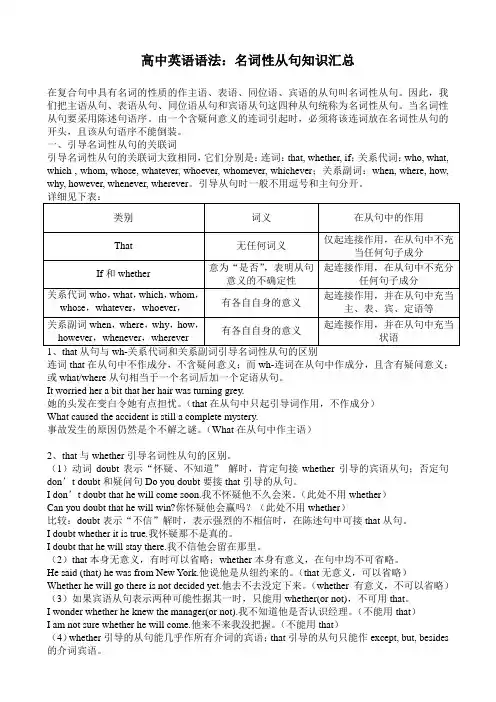
高中英语语法:名词性从句知识汇总在复合句中具有名词的性质的作主语、表语、同位语、宾语的从句叫名词性从句。
因此,我们把主语从句、表语从句、同位语从句和宾语从句这四种从句统称为名词性从句。
当名词性从句要采用陈述句语序。
由一个含疑问意义的连词引起时,必须将该连词放在名词性从句的开头,且该从句语序不能倒装。
一、引导名词性从句的关联词引导名词性从句的关联词大致相同,它们分别是:连词:that, whether, if;关系代词:who, what, which , whom, whose, whatever, whoever, whomever, whichever;关系副词:when, where, how, why, however, whenever, wherever。
引导从句时一般不用逗号和主句分开。
连词that在从句中不作成分,不含疑问意义;而wh-连词在从句中作成分,且含有疑问意义;或what/where从句相当于一个名词后加一个定语从句。
It worried her a bit that her hair was turning grey.她的头发在变白令她有点担忧。
(that在从句中只起引导词作用,不作成分)What caused the accident is still a complete mystery.事故发生的原因仍然是个不解之谜。
(What在从句中作主语)2、that与whether引导名词性从句的区别。
(1)动词doubt表示“怀疑、不知道”解时,肯定句接whether引导的宾语从句;否定句don’t doubt和疑问句Do you doubt要接that引导的从句。
I don’t doubt that he will come soon.我不怀疑他不久会来。
(此处不用whether)Can you doubt that he will win?你怀疑他会赢吗?(此处不用whether)比较:doubt表示“不信”解时,表示强烈的不相信时,在陈述句中可接that从句。
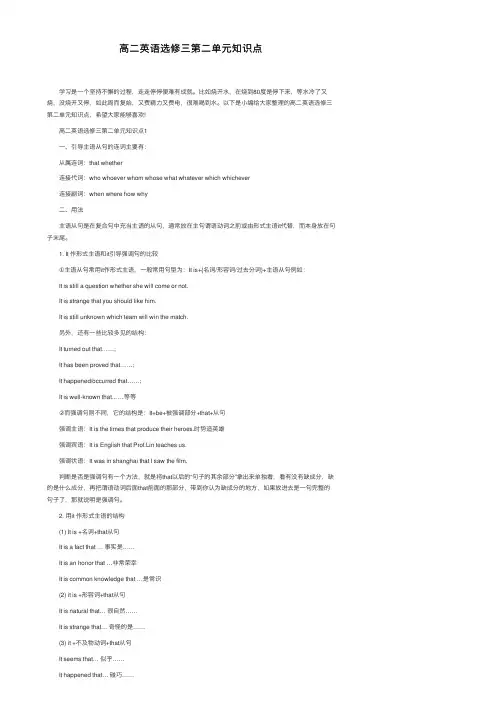
⾼⼆英语选修三第⼆单元知识点学习是⼀个坚持不懈的过程,⾛⾛停停便难有成就。
⽐如烧开⽔,在烧到80度是停下来,等⽔冷了⼜烧,没烧开⼜停,如此周⽽复始,⼜费精⼒⼜费电,很难喝到⽔。
以下是⼩编给⼤家整理的⾼⼆英语选修三第⼆单元知识点,希望⼤家能够喜欢!⾼⼆英语选修三第⼆单元知识点1⼀、引导主语从句的连词主要有:从属连词:that whether连接代词:who whoever whom whose what whatever which whichever连接副词:when where how why⼆、⽤法主语从句是在复合句中充当主语的从句,通常放在主句谓语动词之前或由形式主语it代替,⽽本⾝放在句⼦末尾。
1. It 作形式主语和it引导强调句的⽐较①主语从句常⽤it作形式主语,⼀般常⽤句型为:It is+{名词/形容词/过去分词}+主语从句例如:It is still a question whether she will come or not.It is strange that you should like him.It is still unknown which team will win the match.另外,还有⼀些⽐较多见的结构:It turned out that……;It has been proved that……;It happened/occurred that……;It is well-known that……等等②⽽强调句则不同,它的结构是:It+be+被强调部分+that+从句强调主语:It is the times that produce their heroes.时势造英雄强调宾语:It is English that Prof.Lin teaches us.强调状语:It was in shanghai that I saw the film.判断是否是强调句有⼀个⽅法,就是将that以后的“句⼦的其余部分”拿出来单独看,看有没有缺成分,缺的是什么成分,再把谓语动词后⾯that前⾯的那部分,带到你认为缺成分的地⽅,如果放进去是⼀句完整的句⼦了,那就说明是强调句。

Whether he has left, I can’t say. 他是否走了,我说不定。
②引导主语从句且放在句首时:Whether he will come is still a question. 他是否会来还是个问题。
【注】若在句首使用形式主语 it,而将主语从句放在句末,则有时也可用 if 来引导:It was not known whether [if] he would come. 不知他是否会来。
③ 引导表语从句时:The question is whether we should go on with the work. 问题是我们是否应该继续进行这项工作。
【注】在很不正式的场合if偶尔也用于引导表语从句,但远不如用 whether 常见。
④ 引导让步状语从句时:Whether he agrees or not, I shall do that. 不管他同意与否,我都要那样做。
⑤ 引导同位语从句时:The question whether we need it has not been considered. 我们是否需要它还没有考虑。
⑥ 用于不定式之前时:I’m not sure whether to stay or leave. 我不知是留还是去。
I didn’t know whether to laugh or to cry. 我真是哭笑不得。
⑦用于介词之后时:It depends on whether the letter arrives in time. 这取决于信是否来得及时。
I worry about whether I hurt her feelings. 我担心是否伤了她的感情。
⑧直接与 or not 连用时:I will write to you whether or not I can come. 我能不能来,我将写信告诉你。
【注】若不是直接与 or not 用在一起,则有时也可用 if:I don’t know whether [if] he will win or not. 我不知他是否能赢。
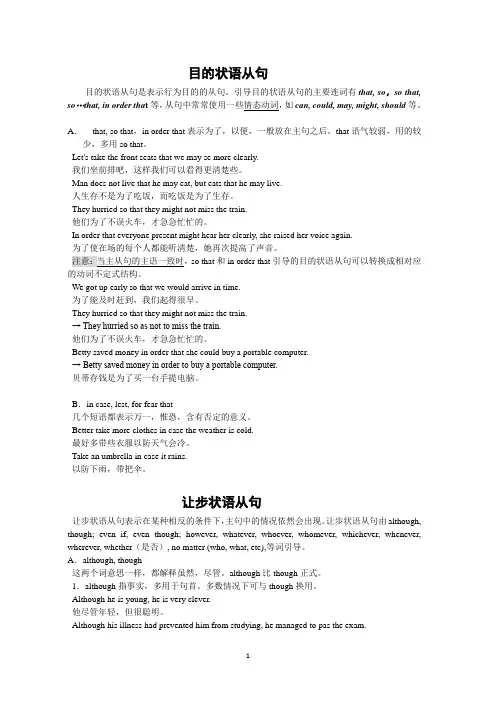
目的状语从句目的状语从句是表示行为目的的从句。
引导目的状语从句的主要连词有that, so,so that, so…that, in order tha t等,从句中常常使用一些情态动词,如can, could, may, might, should等。
A.that, so that,in order that表示为了,以便,一般放在主句之后。
that语气较弱,用的较少,多用so that。
Let's take the front seats that we may se more clearly.我们坐前排吧,这样我们可以看得更清楚些。
Man does not live that he may eat, but eats that he may live.人生存不是为了吃饭,而吃饭是为了生存。
They hurried so that they might not miss the train.他们为了不误火车,才急急忙忙的。
In order that everyone present might hear her clearly, she raised her voice again.为了使在场的每个人都能听清楚,她再次提高了声音。
so that和in order that引导的目的状语从句可以转换成相对应的动词不定式结构。
We got up early so that we would arrive in time.为了能及时赶到,我们起得很早。
They hurried so that they might not miss the train.→ They hurried so as not to miss the train.他们为了不误火车,才急急忙忙的。
Betty saved money in order that she could buy a portable computer.→ Betty saved money in order to buy a portable computer.贝蒂存钱是为了买一台手提电脑。
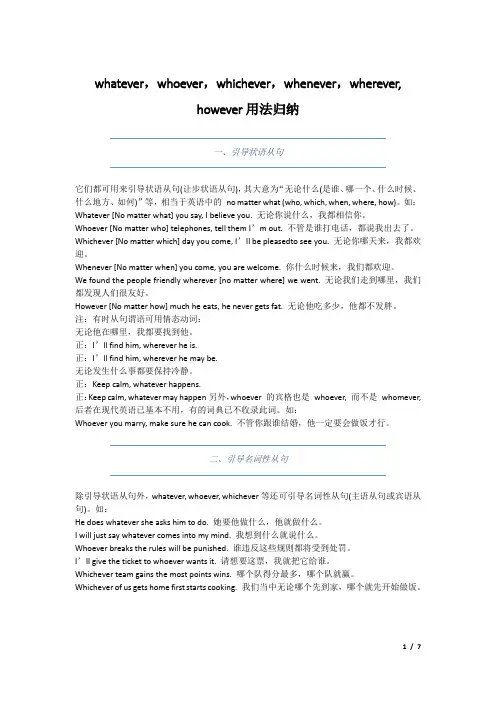
whatever,whoever,whichever,whenever,wherever,however用法归纳一、引导状语从句它们都可用来引导状语从句(让步状语从句),其大意为“无论什么(是谁、哪一个、什么时候、什么地方、如何)”等,相当于英语中的no matter what (who, which, when, where, how)。
如:Whatever [No matter what] you say, I believe you. 无论你说什么,我都相信你。
Whoever [No matter who] telephones, tell them I’m out. 不管是谁打电话,都说我出去了。
Whichever [No matter which] day you come, I’ll be pleasedto see you. 无论你哪天来,我都欢迎。
Whenever [No matter when] you come, you are welcome. 你什么时候来,我们都欢迎。
We found the people friendly wherever [no matter where] we went. 无论我们走到哪里,我们都发现人们很友好。
However [No matter how] much he eats, he never gets fat. 无论他吃多少,他都不发胖。
注:有时从句谓语可用情态动词:无论他在哪里,我都要找到他。
正:I’ll find him, wherever he is.正:I’ll find him, wherever he may be.无论发生什么事都要保持冷静。
正:Keep calm, whatever happens.正:Keep calm, whatever may happen另外,whoever 的宾格也是whoever, 而不是whomever, 后者在现代英语已基本不用,有的词典已不收录此词。
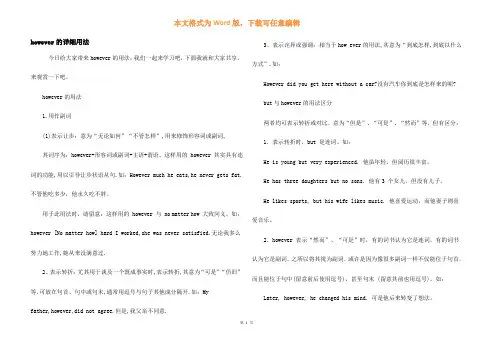
however的详细用法今日给大家带来however的用法,我们一起来学习吧,下面我就和大家共享,来观赏一下吧。
however的用法1.用作副词(1)表示让步:意为“无论如何”“不管怎样”,用来修饰形容词或副词,其词序为:however+形容词或副词+主语+谓语。
这样用的 however 其实具有连词的功能,用以引导让步状语从句.如:However much he eats,he never gets fat.不管他吃多少,他永久吃不胖。
用于此用法时,请留意:这样用的 however 与 no matter how 大致同义,如:however [No matter how] hard I worked,she was never satisfied.无论我多么努力地工作,她从来没满意过.2、表示转折:尤其用于谈及一个既成事实时,表示转折,其意为“可是”“仍旧”等.可放在句首、句中或句末,通常用逗号与句子其他成分隔开.如:Myfather,however,did not agree.但是,我父亲不同意. 3、表示诧异或强调:相当于how ever的用法,其意为“到底怎样,到底以什么方式”.如:However did you get here without a car?没有汽车你到底是怎样来的呢? but与however的用法区分两者均可表示转折或对比,意为“但是”、“可是”、“然而”等,但有区分: 1. 表示转折时,but 是连词。
如:He is young but very experienced. 他虽年轻,但阅历很丰富。
He has three daughters but no sons. 他有3 个女儿,但没有儿子。
He likes sports, but his wife likes music. 他喜爱运动,而他妻子则喜爱音乐。
2. however 表示“然而”、“可是”时,有的词书认为它是连词,有的词书认为它是副词。
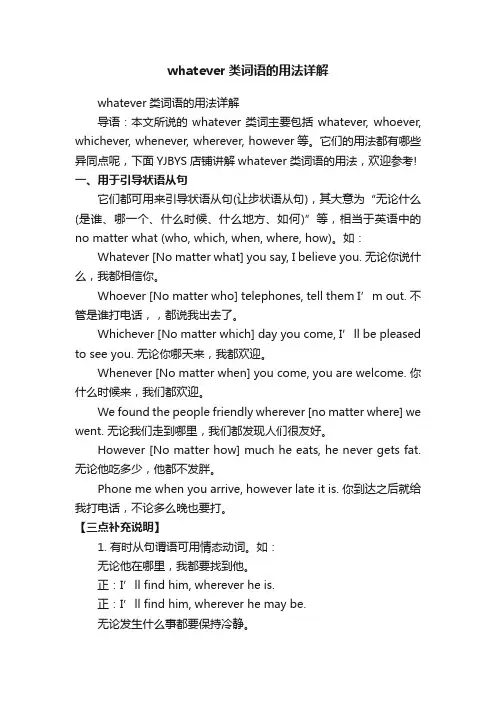
whatever类词语的用法详解whatever类词语的用法详解导语:本文所说的whatever类词主要包括whatever, whoever, whichever, whenever, wherever, however等。
它们的用法都有哪些异同点呢,下面YJBYS店铺讲解whatever类词语的用法,欢迎参考!一、用于引导状语从句它们都可用来引导状语从句(让步状语从句),其大意为“无论什么(是谁、哪一个、什么时候、什么地方、如何)”等,相当于英语中的no matter what (who, which, when, where, how)。
如:Whatever [No matter what] you say, I believe you. 无论你说什么,我都相信你。
Whoever [No matter who] telephones, tell them I’m out. 不管是谁打电话,,都说我出去了。
Whichever [No matter w hich] day you come, I’ll be pleased to see you. 无论你哪天来,我都欢迎。
Whenever [No matter when] you come, you are welcome. 你什么时候来,我们都欢迎。
We found the people friendly wherever [no matter where] we went. 无论我们走到哪里,我们都发现人们很友好。
However [No matter how] much he eats, he never gets fat. 无论他吃多少,他都不发胖。
Phone me when you arrive, however late it is. 你到达之后就给我打电话,不论多么晚也要打。
【三点补充说明】1. 有时从句谓语可用情态动词。
如:无论他在哪里,我都要找到他。
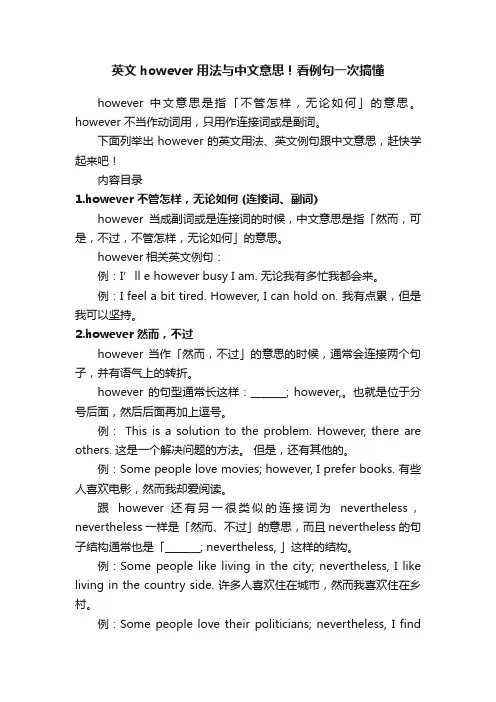
英文however用法与中文意思!看例句一次搞懂however 中文意思是指「不管怎样,无论如何」的意思。
however 不当作动词用,只用作连接词或是副词。
下面列举出however的英文用法、英文例句跟中文意思,赶快学起来吧!内容目录1.however 不管怎样,无论如何 (连接词、副词)however当成副词或是连接词的时候,中文意思是指「然而,可是,不过,不管怎样,无论如何」的意思。
however相关英文例句:例:I’ll e however busy I am. 无论我有多忙我都会来。
例:I feel a bit tired. However, I can hold on. 我有点累,但是我可以坚持。
2.however 然而,不过however 当作「然而,不过」的意思的时候,通常会连接两个句子,并有语气上的转折。
however 的句型通常长这样:_______; however,。
也就是位于分号后面,然后后面再加上逗号。
例:This is a solution to the problem. However, there are others. 这是一个解决问题的方法。
但是,还有其他的。
例:Some people love movies; however, I prefer books. 有些人喜欢电影,然而我却爱阅读。
跟however 还有另一很类似的连接词为nevertheless,nevertheless 一样是「然而、不过」的意思,而且 nevertheless 的句子结构通常也是「_______; nevertheless, 」这样的结构。
例:Some people like living in the city; nevertheless, I like living in the country side. 许多人喜欢住在城市,然而我喜欢住在乡村。
例:Some people love their politicians; nevertheless, I findpolitician are not always honest. 许多人喜欢自己支持的政客,然而我却发现有些政客很不诚实。
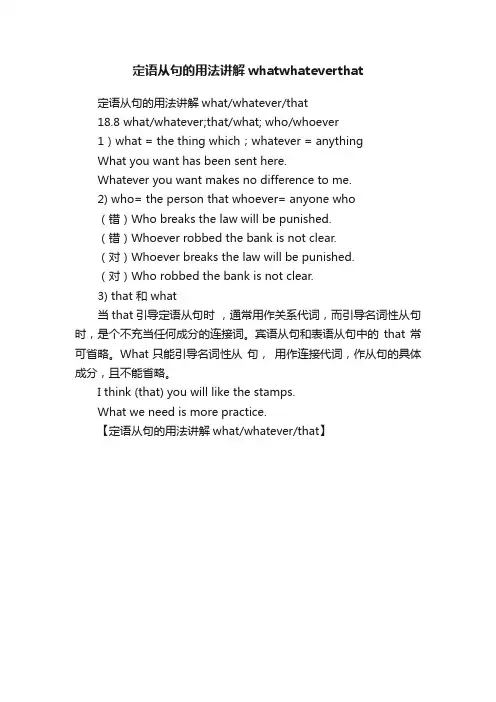
定语从句的用法讲解whatwhateverthat
定语从句的用法讲解what/whatever/that
18.8 what/whatever;that/what; who/whoever
1)what = the thing which;whatever = anything
What you want has been sent here.
Whatever you want makes no difference to me.
2) who= the person that whoever= anyone who
(错)Who breaks the law will be punished.
(错)Whoever robbed the bank is not clear.
(对)Whoever breaks the law will be punished.
(对)Who robbed the bank is not clear.
3) that 和 what
当that引导定语从句时,通常用作关系代词,而引导名词性从句时,是个不充当任何成分的连接词。
宾语从句和表语从句中的that常可省略。
What只能引导名词性从句,用作连接代词,作从句的具体成分,且不能省略。
I think (that) you will like the stamps.
What we need is more practice.
【定语从句的用法讲解what/whatever/that】。
1.What 和whatever都可以引导名词性从句(包括主语从句,宾语从句,表语从句,同位语从句),但意义略有不同。
What相当于the thing that,而whatever相当于anything that。
例句:1)主语从句)The thing that you need is a good meal.(先行词为the thing 的定语从句)2)I’宾语从句) (意为:我会给她她需要的东西。
)I’ll give her the thing that she needs. (先行词为the thing 的定语从句)3)I’宾语从句) (我会给她任何她需要的东西。
)I’ll give her anything that she needs. (先行词为the thing 的定语从句)比较2)和3)组例句体会what 和whatever在语义上的不同。
2.Whatever 可以引导让步状语从句,what不可以。
1)Whatever she needs, I’ll give it to her.2)You’ll have our support, whatever you decide.Whatever引导的状语从句可以转换为:no matter what引导的句子3)No matter what she needs, I’ll give it to her.4)You’ll have our support, no matter what you decide.5)I ’ve decided to leave tomorrow, no matter what (happens). 不管发生什么情况,我已决定明天走。
6)In our company, every body is well taken care of, no matter whathis position (is). 在我们公司,每个人都得到很好的照顾,不管他地位如何。
编辑整理:尊敬的读者朋友们:这里是精品文档编辑中心,本文档内容是由我和我的同事精心编辑整理后发布的,发布之前我们对文中内容进行仔细校对,但是难免会有疏漏的地方,但是任然希望(2019年高考英语语法必考考点(13)名词性从句(含解析))的内容能够给您的工作和学习带来便利。
同时也真诚的希望收到您的建议和反馈,这将是我们进步的源泉,前进的动力。
本文可编辑可修改,如果觉得对您有帮助请收藏以便随时查阅,最后祝您生活愉快业绩进步,以下为2019年高考英语语法必考考点(13)名词性从句(含解析)的全部内容。
李仕才【考点解读】一、名词性从句的种类名词性从句包括主语从句、宾语从句、表语从句、同位语从句。
二、引导名词性从句的连接词1.连接代词:who, whose, whom, what, which有词义,在从句中担任成分,如主语、表语、宾语或定语等。
It has not been decided yet when we will leave。
We are worrying about what we should do next.2.连接副词:when, where, why, how有词义,在从句中担任成分,作状语。
It makes no difference where we shall have the meeting。
Scientists study how human brains work to make computers。
(2012·四川高考)3.连接词: whether, if, as if, if (whether), as if虽有词义,但在从句中不充当任何成分,只起连接作用;that无词义,在从句中也不充当任何成分,只起连接作用,有时可省略。
My suggestion is that we (should) have a discussion about this matter.The question whether we need more time to do the work hasn’t been discussed。
whatever的用法(共10篇)whatever的用法(一): whatever,在口语里的用法Whatever! 随便. Whatever 在口语上的意思就是“随便, 无所谓” 例如别人问你, “Do you like apple or banana” (你喜欢苹果还是香蕉)要是你并没有什么特别嗜好的话, 就可以说, “Whatever!” 不过这句话...whatever的用法(二): no matter what 和whatever的用法(啥时可替换,啥时不行)其实是这样的:no matter what 只能引导状语从句,不能引导名词性从句(例如主语从句,宾语从句)而whatever 既可以引导状语从句,又可以引导名词性从句,他用的范围比较广,所以当whatever 和no matter what 一起出现的时候,考点肯定是考“no matter what 不能引导名词性从句”,所以考题出现的时候就选whatever 而不选 no matter what下面举个例子吧:No matter what you say is of no importance now.(错)Whatever you say is of no importance now.(对)看第一句,no matter what you say 这一部分是整句句子的主语,所以no matter what 引导的是主语从句,但是no matter what 是不能引导主语从句的(名词性从句的一种),所以这句话是错的而第二句,whatever you say 也同样是句子的主语,而whatever 可以引导名词性从句,所以这句话是对的下面我再举一个引导状语从句的例子No matter what happened ,he would not mind.Whatever happened ,he would not mind.这两句都是对的,因为这两句从句都是让步状语从句,而no matter what 和whatever 都可以引导,所以是对的注:no matter what 和whatever 就是一个代表,像no matter how ,no matter where 之类的和 wherever ,whoever 之类的是一样处理的whatever的用法(三): what和whatever在用法上有什么区别还有类似的how和however等等在单选题的时候什么情况下用what,什么时候用whatever哦whatever可以扩展成no matter what,翻译成”无论什么”.依此类推,however就是no matter how”无论怎样”,而what,how本身没有这类意思,做单选题的时候,你就把翻译往里面带就好了.看看能不能行得通,还有就是however,whatever可以引导一个主语从句,而单独的what,how只能用于主句提问...如果还没明白就把题目贴上来,详解whatever的用法(四): 英语语法No matter what 与whatever 的区别以及用法我觉得单词或词组辨异的时候,最重要的是抓住问题的本质.比如说:(1)no matter what的本义就是“是什么东西不重要”,它一般被视为“副词”对待,在主从复合句中常作状语,其意思等价于regardless of whatever (不管/不看/不论它什么东西);(2)whatever的本义是“曾经是个什么东西,某一次曾作为某物出现过的东西”,它是一个名词,常作“主语”和“宾语”.另外还有一个whatsoever也是需要认真理解和区分的,详细分析请看“英语帮”网站的原创文章:关于whatever和whatsoever的辨析【whatever的用法】whatever的用法(五): However和Whatever的用法._________ hungry I am,I never seem to be able to finish off a whole pizza.A.HoweverB.HowC.WhateverD.What为什们呢能给具体讲一下However 和 whatever 的用法么However 是表示“无论如何”,后面通常跟形容词Whatever 是表示“无论什么”比如:However much I sleep,I still feel tired.我无论睡如何久,我还是感觉累.Whatever he does,he is forgiven.无论他做什么事,他都被原谅.whatever的用法(六): Whatever和 No Matter What的区别与用法"no matter +疑问词" 或"疑问词+后缀ever" .注意:no matter 不能引导主语从句和宾语从句.这么多好辛苦的!给分啊!【whatever的用法】whatever的用法(七): no meter howno meter what用法和whatever,however的区别,no matter what 只能引导让步状语从句不可以引导名词性从句.如:No matter when I"m unhappy,it is my friend who cheers me up .不管什么时候我不开心了,总是我的朋友使我振奋起来.whatever既可以引导让步状语从句,也可以引导名词性从句.如如:Whatever was said here must be kept secret.我们在这儿说的无论什么都必须保密.(名词性从句)如:The lawyer seldom wears anything other than asuit ,whatever the season is.无论什么季节,这位律师除了一套西装以外很少穿其他衣服.(让步状语从句)whatever在句子中做宾语,如whatever you want,无论你想要什么 .however在句子中做状语,如 however you want it,无论如何你想要它. 前者的句子必缺少成分,you want句子不完整,缺宾语.而后者用的句子是完整的,you want it,这句话是完整的.所以,判断是whatever还是however,只要判断句子完整与否就好了.whatever的用法(八): 请问Whatever 在这个句子中的用法Whatever the topic, he has sth interesting to talk about it.请问Whatever the topic 在句中做什么成分等待高手回答,谢谢!首先句子有问题,应该是whatever the topic is,he has sth interesting to talk about.应该是表语.你这样想,the topic is whatever(主系表)whatever的用法(九): nomatterwhat与whatever有什么不同(用法)no matter what:只能引导让步状语从句whatever:既可以引导名词性从句,也可以引导让步状语从句.引导让步状语从句时,可以替换为no matter what;名词性从句则不能与之直接替换.例如:Whatever happenes will never change my Chinese heart.No matter what happens,it will never change my Chinese heart.You can do whatever you like.whatever的用法(十): no matter what和whatever用法怎么区别SOS!no matter what用于状语从句 whatever用于宾语,表语,主语从句,不能用同位语从句.说明:1.Whatever is said by our parents,we should obey.( Whatever our parents say,-----------------------).2.The problem is whatever the weather will be like .比较No matter what(不用Whatever) the weather will be like,the competetion has to go on.(状语从句) 3.I try to understand whatever the the teachers explain to us in class.(例1、2、2分别属于主、表、宾从句) 4.The fact that he makes little progress no matter what(不用whatever) knowledge he tries to master leads to his being absent from classes (这里no matter what引导让步状语从句).(that 不能题换成whatever).因whatever 不引导同为语从句.5.No matter what he says ,I won"t believe him.6.(比较)Whatever he says is not believable.(主语从句) 7.You can choose whatever you likes.(宾语从句)whatever吉他谱whatever造句。
⼀、基本⽤法概说 英语中的-ever 词主要包括 whatever, whoever, whichever, whenever, wherever, however 等,其中可引导名词性从句的主要有whatever, whoever, whichever。
这⾥所说的名词性从句主要指主语从句和宾语从句,它们通常不⽤于引导同位语从句,同时也很少⽤于引导表语从句。
如: Whatever he said was right. ⽆论他说什么都是对的。
(引导主语从句) I don’t believe whatever he said. ⽆论他说什么我都不信。
(引导宾语从句) 在某些特定的语境中,也可⽤于引导表语从句。
如: What he wants to get is whatever you have. 他想得到的是你所拥有的⼀切。
⼆、whatever引导的名词性从句 whatever的意思是“所……的⼀切事或东西”,可视为what的强调说法,其含义⼤致相当于anything that,whatever在从句中可⽤作主语、宾语、定语。
如: Do whatever she tells you and you’ll have peace. 她叫你⼲什么你就⼲什么,那你就太平了。
I don’t believe in letting children do whatever they like. 我不赞成让孩⼦为所欲为。
Goats eat whatever food they can find. ⼭⽺找到什么⾷物就吃什么⾷物。
三、whoever引导的名词性从句 whoever的意思“任何……的⼈”,在意义上⼤致相当于 anybody who。
whoever在从句中可⽤作主语或宾语。
如: I’ll take whoever wants to go. 谁想去我就带谁去。
Whoever says that is a liar. 说那话的⼈是个骗⼦。
•从属连词可分为三大类:1、that (无词义,不做成分)if,whether (表达是否的意义,但不做句子成分)2、连接代词:who,whom,whose,what,which,whatever, whoever, whichever(有词义,在句子中可作主语、表语、宾语)3、连接副词:when,where,why,how,how many,how long,how far,however,whenever,wherever (有词义,作从句的状语)用法:从结构上说,英语连接词分两大类:并列连词和从属连词。
并列连词连接两个或两个以上地位平等的字、词组或分句。
例如:(1) Air and water are indispensable to me.(2) She likes going out with friends or playing outdoor games.(3) Most workers have a good income, so they look very happy.从属连词连接两个或两个以上的分句,形成复杂句中的从属分句。
例如:(4) He said that he did not want to go .(5) Many things have happened since I last saw him.(6) You may come if you want to.从属连词用来连接各种从句。
until(till)直到,在用until表达时间状语的句子中,主句中的动词是要十分小心去选择的。
如动词是持续行动词,它要用肯定句,如:I studied hard until 12 o'clock last night.如果动词是瞬间截止性动词,则要用否定句,如:He didn't go to bed until his mother came back.由since,for,by,before, 来引导的时间状语从句。